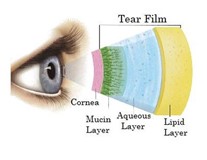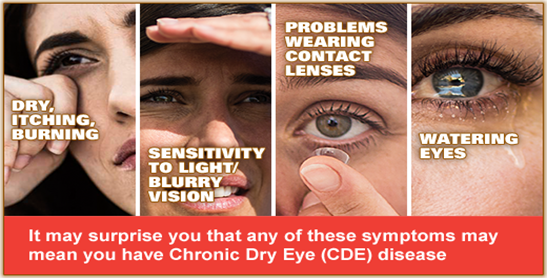What Is Dry Eye Syndrome?
![]()
Millions of Americans are affected by dry eye syndrome. Dry eye is a common and chronic condition in which the tears are not sufficient enough to lubricate and nourish the eye. Tears are very important for providing great vision and maintaining the health of your eye. Symptoms can range from mild irritation to severe symptoms that affect daily life. If you have dry eyes, you either do not produce enough tears or have a poor quality of tears. Dr. Love can educate you on how to treat and prevent future damage from dry eyes. If you are experiencing persistent symptoms of dry eye, it is importanct to contact Clermont Family Eyecare for a dry eye evaluation at 352-293-2183.
What Are Tears and Why Are They Important?
![]()
Tears are made of three main layers:
- Water (for moisture)
- Oils (for lubrication)
- Mucus (for even spreading)
Tears are secreted by special glands located around the eye and in the eyelids. Each time you blink your eye, the tears spread across the front surface of the eye or the cornea. Tears drain out of the eye through small drainage ducts located on the inner corners of the eyelid. Tears provide lubrication to the eye, reduce the risk of infection and wash away any matter that is in the eye. If there is an imbalance of the tear production and drainage, then a person may experience dry eyes.
What Are the Symptoms of Dry Eye Syndrome?
- Stinging or burning
- Gritty feeling
- Scratchy eyes
- Foreign body sensation
- Blurred vision
- Excess watering
- Redness
- Tired or irritated eyes
![]()
Some patients experience painful symptoms while others are not aware that their glands are dying off and have no symptoms. Excessive tears running down the face like you are crying is a symptom of dry eyes.
Make sure to schedule an appointment with Clermont Family Eyecare if you are experiencing any dry eye symptoms or if you would like to have a full dry eye evaluation.
What Are the Causes of Dry Eye Syndrome?
Dry eyes can result from several factors that dry out the tear film other than an insufficient tear system. Some of these factors can be due to dry air from air conditioning, heat, or other environmental conditions. There are several conditions that increase the chance of developing dry eyes, such as,
- Age – As we age, tear production tends to diminish. Dry eyes are more predominant in people over the age of 45.
- Gender – Women tend to be more likely to develop dry eyes due to hormonal changes with pregnancy, menopause, and contraceptives.
- Medications – Many prescriptions like antihistamines, decongestants, blood pressure medications and antidepressants can cause a reduction in tears as a side effect.
- Medical Conditions– Anyone with diabetes, rheumatoid arthritis, thyroid problems, and blepharitis are more likely to experience dry eye symptoms.
- Environmental Conditions– Exposure to smoke, wind, and dry climates speed up the evaporation process, leading to dry eyes. Long hours on the computer, video games, tablets and watching television can take a huge toll on the eyes and lead to dry eyes because you blink less when staring at these screens.
- Other Factors– Long-term contact lens wearers and recipients of any eye surgery such as LASIK, PRK, cataracts are also more susceptible to dry eyes than those that wear glasses or use no form of vision correction.
What Is the Treatment for Dry Eye Syndrome?
Usually, the first thing that comes to mind is to purchase an over the counter eye drop. Many times, over the counter eye drops offer short term relief and the problem is masked. Therefore, the conditions go untreated for years. There are a number of steps that can be taken to treat dry eye but there isn’t a cure for the condition. Dr. Love has a dry eye starter pack that is available to everyone in order to help prevent and ease dry eyes. If you are experiencing dry eye syndrome, call us to see what we can do for you. Dry eye syndrome can be frustrating, but we can help relieve your annoying dry eye symptoms. At Clermont Family Eyecare, we offer a wide range of options for your dry eye treatment needs. Schedule your appointment with us today by scheduling online or calling our office at 352-293-2183.
Treatments for dry eyes may include:
- Eye Drops
- Over the Counter Eye Drops
- Prescription Eye Drops
- Meibomian Gland Expression
- Heat Therapy
- In Office Therapy with Tear Care
- At home maintenance with heat mask
- Lid Hygiene
- In Office Deep Cleaning with Blephex
- At home maintenance with lid cleansers
- Advanced Office treatments
- Nutritional Supplements
- Studies have found that omega-3 fatty acids, omega-6 fatty acids, gamma linolenic acid (GLA), antioxidants and other nutrients support proper tear secretion and a healthy tear film. Good sources of omega-3 include cold-water fish such as salmon, cod, herring, and sardines. Flaxseed oil is a great source to help relieve dry eye. Simply drinking more water will help to keep the body and eyes hydrated.
![]()
- Stay Hydrated with Water
- Drink plenty of water each day. It is recommended that you drink half of your body weight in ounces. If you weigh 150 lbs then you should drink 75 oz of water daily. Insufficient water intake can contribute to a reduced supply of tears, especially if you live in a hot and dry climate.
- 20/20/20 Rule
- Make sure to take a break from your screen every 20 minutes, look at an object that is 20 feet away for 20 seconds. This forces your eyes to blink and relax which can help relieve dry eyes and computer eye strain.
- Blink Exercises
- Research has shown that people blink less frequently when viewing electronic devices like the computer, tablet, cell phone, etc. Dry eye symptoms can worsen with a decreased blink rate so try to blink more often when using electronic devices, reading books and watching television. Perform full blinks by gently squeezing your eyelids together in order to fully spread a fresh layer of tears over your eyes.
- Wear Quality Sunglasses that block 100% UV
- Medication Adjustment
- Many over the counter and prescription medications, including anti-histamines, birth control pills, acne medications, blood pressure medications, anti-depressants and many more can cause or worsen dry eye condition. It is very important to let your eye doctor know all of your medications and if you are experiencing any dry eye discomfort. Do not discontinue a prescription medication without consulting with your primary care physician.
- Adjust Contact Lens Wear or Material
- Sometimes it is difficult to tell if the contact lens discomfort is caused by the contact lenses or an underlying dry eye condition. Love recommends that you switch to a daily disposable contact lens that you trash each day or corneal refractive therapy (CRT) prior to discontinuing contact lenses all together.
Call 352-293-2183 today to schedule your dry eye evaluation!

Our Location
210 N Hwy 27, Suite 7
Clermont, FL 34711
(352) 243-2700






